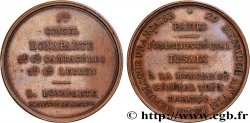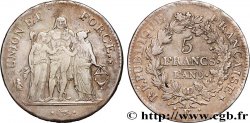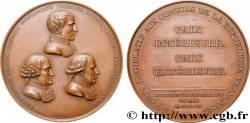fme_962671 - CONSULAT Médaille de reconnaissance au premier consul
无库存.
所有在网站上销售的产品 (2025)
价格 : 120.00 €
所有在网站上销售的产品 (2025)
价格 : 120.00 €
种类 Médaille de reconnaissance au premier consul
日期: 1803
铸币厂名称/城市 59 - Lille
材质 bronze
直径 49,5 mm
模子方针 12 h.
硬币制模工 H. AUGUSTE
重量 68,94 g.
侧面 lisse
印模 sans poinçon
关于品相的说明
Jolie patine marron hétérogène malgré quelques taches noires d’oxydation. Présence de quelques coups et rayures. Restes de brillant de frappe
出版目录中的项代码 :
正面
正面的文字 BONAPARTE PREMIER CONSUL DE LA RÉPUBLIQUE FRANÇAISE.
正面的说明书 Buste de Napoléon Bonaparte à gauche ; légende autour.
背面
背面的文字 LA VILLE DE LILLE AU PREMIER CONSUL // AMOUR, / FIDÉLITÉ, / RECONNOISSANCE // ARRÊTÉ DU CONSEIL / MUNICIPAL DU XIX / GEMRINAL AN XI / 9 AVRIL 1803.
背面的说明书 Légende en huit ligne, l’une courbe, trois horizontales et quatre à l’exergue.
评论
Créée le 2 mai 1483, la « confrérie des canonniers et couleuvriniers » de Lille est alors appelée confrérie de sainte Barbe. Elle participe dès lors à la défense de la ville avec les armes de l'artillerie. Ainsi, lorsque Louis XIV fait le siège de la ville, les Canonniers le combattent. Pour récompenser leur courage, et leur habileté, Louis XIV leur garantit le maintien de leurs privilèges, et leur octroie deux canons d'honneur.
En 1708, les canonniers participent, aux côtés des troupes françaises, à la défense de la ville lors du siège de 1708. Le Canonnier maitre charron Jacques Boutry s'illustre par son ingéniosité pour réparer la porte d'eau, charnière de la défense lilloise. Il est récompensé par le maréchal de Boufflers qui l'anoblit.
Le siège de 1792, est le fait d'armes plus marquant de l'histoire des Canonniers. La confrérie de Sainte-Barbe a été dissoute, mais les confrères se sont tous engagés volontaires et servent dans le même bataillon "Égalité". La résistance des Lillois est héroïque. Les Canonniers n'ont pas quitté les remparts de tout le siège, y compris le capitaine Charlemagne Ovigneur qui apprend que sa maison et ses ateliers brûlent, et que sa femme accouche la même nuit.
Napoléon Bonaparte rend hommage à cette résistance et c'est en tant que consul qu'il reforme un bataillon distinct de la garde nationale le 31 août 1803, le bataillon des canonniers sédentaires de Lille. Il leur offre deux canons Gribeauval, présentés au musée des canonniers, l'Hôtel qu'ils occupent toujours, et remet au capitaine Ovigneur, la Légion d'honneur..
Created on May 2, 1483, the “brotherhood of gunners and culverins” of Lille was then called the brotherhood of Saint Barbara. She then participated in the defense of the city with artillery weapons.. So, when Louis XIV laid siege to the city, the Gunners fought him. To reward their courage and their skill, Louis XIV guaranteed them the maintenance of their privileges, and granted them two cannons of honor..
In 1708, the gunners participated, alongside the French troops, in the defense of the city during the siege of 1708. Master Gunner and Wheelwright Jacques Boutry distinguished himself with his ingenuity in repairing the water gate, the hinge of Lille's defenses.. He was rewarded by Marshal de Boufflers who ennobled him..
The siege of 1792 is the most significant feat of arms in the history of the Gunners. The Brotherhood of Saint Barbara was dissolved, but the brothers all volunteered and served in the same \\\"Equality\\\" battalion.. The resistance of the people of Lille is heroic. The gunners did not leave the ramparts during the entire siege, including Captain Charlemagne Ovigneur who learned that his house and workshops were burning, and that his wife was giving birth the same night..
Napoleon Bonaparte paid tribute to this resistance and it was as consul that he reformed a separate battalion of the national guard on August 31, 1803, the battalion of sedentary gunners of Lille.. He offered them two Gribeauval cannons, presented at the gunners' museum, the Hôtel they still occupy, and awarded Captain Ovigneur the Legion of Honour..
En 1708, les canonniers participent, aux côtés des troupes françaises, à la défense de la ville lors du siège de 1708. Le Canonnier maitre charron Jacques Boutry s'illustre par son ingéniosité pour réparer la porte d'eau, charnière de la défense lilloise. Il est récompensé par le maréchal de Boufflers qui l'anoblit.
Le siège de 1792, est le fait d'armes plus marquant de l'histoire des Canonniers. La confrérie de Sainte-Barbe a été dissoute, mais les confrères se sont tous engagés volontaires et servent dans le même bataillon "Égalité". La résistance des Lillois est héroïque. Les Canonniers n'ont pas quitté les remparts de tout le siège, y compris le capitaine Charlemagne Ovigneur qui apprend que sa maison et ses ateliers brûlent, et que sa femme accouche la même nuit.
Napoléon Bonaparte rend hommage à cette résistance et c'est en tant que consul qu'il reforme un bataillon distinct de la garde nationale le 31 août 1803, le bataillon des canonniers sédentaires de Lille. Il leur offre deux canons Gribeauval, présentés au musée des canonniers, l'Hôtel qu'ils occupent toujours, et remet au capitaine Ovigneur, la Légion d'honneur..
Created on May 2, 1483, the “brotherhood of gunners and culverins” of Lille was then called the brotherhood of Saint Barbara. She then participated in the defense of the city with artillery weapons.. So, when Louis XIV laid siege to the city, the Gunners fought him. To reward their courage and their skill, Louis XIV guaranteed them the maintenance of their privileges, and granted them two cannons of honor..
In 1708, the gunners participated, alongside the French troops, in the defense of the city during the siege of 1708. Master Gunner and Wheelwright Jacques Boutry distinguished himself with his ingenuity in repairing the water gate, the hinge of Lille's defenses.. He was rewarded by Marshal de Boufflers who ennobled him..
The siege of 1792 is the most significant feat of arms in the history of the Gunners. The Brotherhood of Saint Barbara was dissolved, but the brothers all volunteered and served in the same \\\"Equality\\\" battalion.. The resistance of the people of Lille is heroic. The gunners did not leave the ramparts during the entire siege, including Captain Charlemagne Ovigneur who learned that his house and workshops were burning, and that his wife was giving birth the same night..
Napoleon Bonaparte paid tribute to this resistance and it was as consul that he reformed a separate battalion of the national guard on August 31, 1803, the battalion of sedentary gunners of Lille.. He offered them two Gribeauval cannons, presented at the gunners' museum, the Hôtel they still occupy, and awarded Captain Ovigneur the Legion of Honour..








 对产品描述纠错
对产品描述纠错 打印
打印 分享我的选择
分享我的选择 提问
提问 Consign / sell
Consign / sell
 产品介绍
产品介绍









